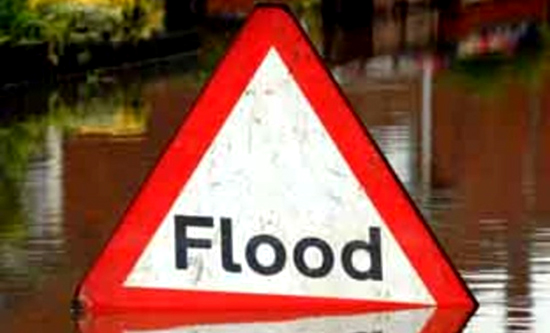
By world standards, the bad weather which has hit Britain since December might not seem to be of enormous significance. Around 6,000 properties have been flooded, while in countries like Bangladesh, where much of the country lies underwater during the Monsoon, more than 100 people died in the floods of 2012. But what the floods exposed was the futility and deceit of the local and national government bodies. With the most deprived parts of England three times more vulnerable to flooding than the richest, this winter’s crisis was mainly ignored until, as one observer put it, ‘the effluent hit the affluent’. Meanwhile it sends all of us a warning about the threat of major climate change.
Heavy rainfall made this the wettest winter since records began in 1766. According to models, it is related to factors such as the melting of Arctic sea ice, the warming of South East Asia and the Pacific Ocean, and the alteration of the Jet Stream which regulates weather systems in the northern hemisphere. The result has been a succession of wet and stormy fronts hitting Britain. Even Prime Minister David Cameron was prepared to acknowledge the part played by climate change, though his Tory chums are deeply divided on the question. For example Environment Secretary Owen Paterson is a notorious climate change denier who refuses to plan for worsening weather as he doesn’t believe it will happen. But according to the 2008 Pitt Report into Britain’s floods the previous summer, flood damage could rise to £27 billion annually by 2080 (from a current level of around £1billion a year) as a result of increased rainfall combined with bad land management and other issues. These include recent cutbacks to the Environment Agency, which is responsible for flood prevention, and the drive to privatisation and deregulation.
The issues are clearly outlined is an article by the scientist and writer George Monbiot (The Guardian, 14 January 2014) in which he rails against the building of homes on the floodplain, and attempts to shorten rivers by eliminating snake-like meanders and replacing them with straight channels which accelerate water run-off: a main cause of flooding, as well as drought. In 2011 alone, 38,000 homes were built in parts of England at risk of flooding. As for the Somerset Levels, which have remained flooded since December, 63% of homes in Sedgemore district, which includes the Levels, are on a floodplain.
The run-off problem is exacerbated by soil erosion and deforestation particularly on high ground. The World Wildlife Fund points to overstocking of livestock, inappropriate planting of crops and excessive use of heavy machinery on hillsides as a serious contributing factor to land degradation. But a number of policies, promoted by agribusiness, mean this is unlikely to change. In fact, the European Union – heavily lobbied by the British government – is encouraging the very opposite, increasing the subsidies to farmers who keep livestock on the hillsides, from €250 to €450 per hectare; however, to qualify for the subsidy land must be cleared of all ‘unwanted vegetation’ ie trees, hedges and shrubs. Britain is already one of the least forested countries in Europe. Monbiot cites an interesting experiment at by farmers in Pontbren in the Welsh mountains, which is part of the watershed of the river Severn that flooded badly at Gloucester in 2007, and is at risk again now. These farmers managed to reverse the trend towards land decay and run-off by systematically planting trees on the hills. Trees allow water to be absorbed by soil at at 67 times the rate that grass does, letting water flow down deep channels underground. Reforesting just 5% of land can reduce flooding peaks by 29%. But this initiative is not likely to be repeated, as the British government has abolished all tree-planting grants and the office which subsidised the Pontbren payments is itself being shut down.
Another major issues highlighted by Monbiot is the shift towards growing maize, which is grown to feed not people, but livestock and, increasingly, for the biofuel business. Itse cultivation – which has risen in Britain from 1,400 hectares to 160,000 since 1970 – leaves land completely bare before and after the crop is harvested and depletes its capacity to hold water. Government policy specifically exempts maize cultivation from soil conversation measures. All this, as Monbiot points out, is a formula for repeated flooding.
Martin Harrison




